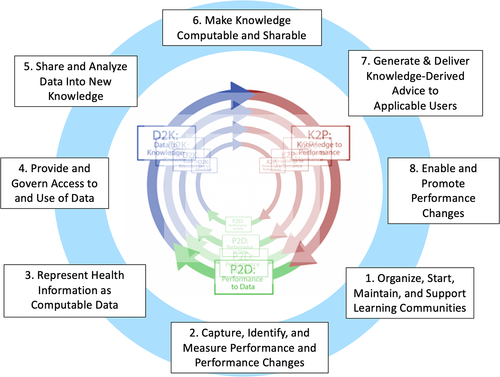The Role of Research in a Learning Health System
- Wendy Chapman
- Sep 26, 2022
- 2 min read
A learner in the first cohort of our Applied Learning Health Systems course asked what differentiates a learning health system from other models like PDSA that are used to address complex systems like healthcare. Well, Chuck Friedman has just weighed in through a new editorial published in the journal of Learning Health Systems. He lists three unique attributes:
(1) at the beginning of the cycle, establish a multistakeholder learning community that is focused on the problem and collaboratively executes the entire cycle
(2) embracing, at the outset, the uncertainty of how to improve against the problem by undertaking a rigorous discovery process before any implementation takes place
(3) supporting multiple co-occurring cycles with a socio-technical infrastructure to create a learning system.
It's been my experience that loose collaboration between healthcare organisations and researchers do not typically deliver the shared infrastructure comprising policies, processes, people and technologies needed to transcend a collection of learning cycles to a learning system. A university can be an effective hub for this infrastructure across healthcare organizations to co-develop infrastructure that can be viewed as an integrated set of services supporting all of the simultaneous cycles to, as Chuck points out, increase efficiency, enable economies of scale, enlarge the scope of clinical problems being addressed.

Meredith introduced me to two additional articles that are influencing our strategic thinking.
Hunter enhanced Friedman's fundamental theorem of informatics by adding the scientific methods to the famous diagram. He describes the scientific method and its associated use of statistical tools as key in identifying information in the data held by the computer. This diagram will be the theme for a symposium we plan to host in late March together with our external review--more to come on that later!

This recent article from Stanford provides one of the most practical examples of an academic-healthcare collaboration I've seen. The authors emphasize the need for the partnership based on the fact that "healthcare improvement that lacks the methodological rigor of research can generate spurious conclusions and potentially harmful changes within a health system. This evidence-practice gap limits a health system's capacity to implement changes informed by valid, reliable, and actionable evidence produced in real-world settings." They lay out their Evaluation Sciences Unit in this diagram:

Regional Linguistic Quirks: "It's a dog's breakfast" - I hear that a lot in my meetings with academics. Apparently, it is British slang from the 1930's and I'm going to practice using it with my family and friends back home.



Comments